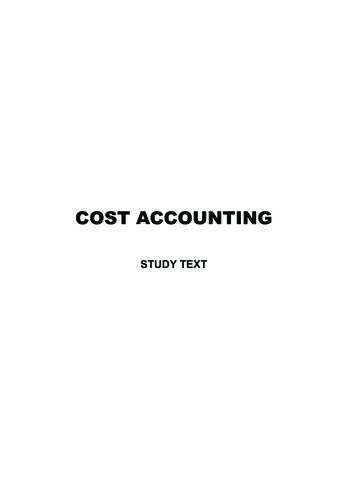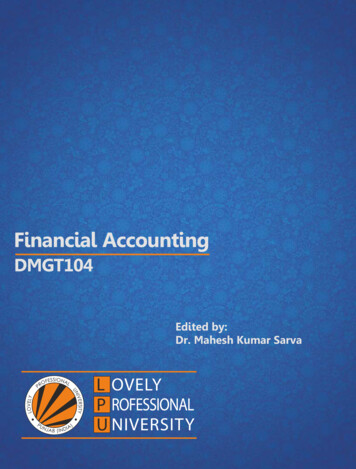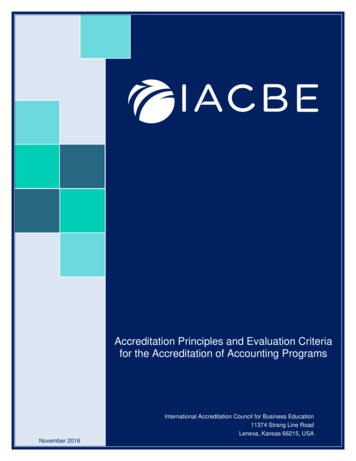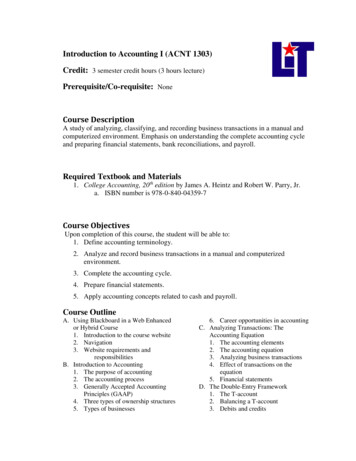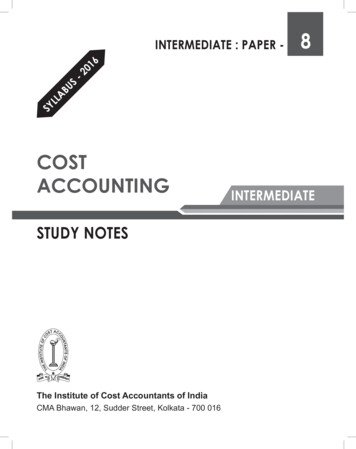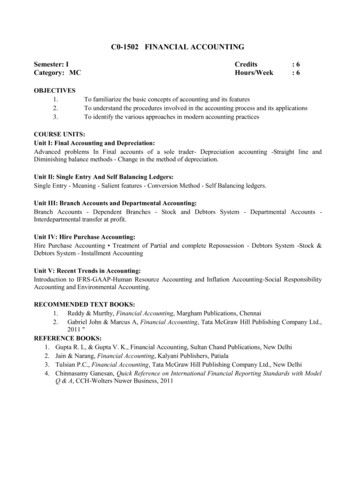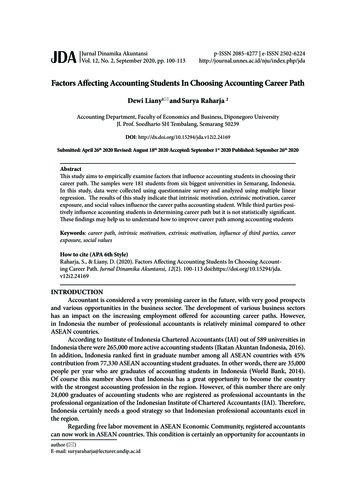
Transcription
JDAJurnal Dinamika AkuntansiVol. 12, No. 2, September 2020, pp. 100-113p-ISSN 2085-4277 e-ISSN jdaFactors Affecting Accounting Students In Choosing Accounting Career PathDewi Liany1 and Surya Raharja 2Accounting Department, Faculty of Economics and Business, Diponegoro UniversityJl. Prof. Soedharto SH Tembalang, Semarang 50239DOI: d: April 26th 2020 Revised: August 18th 2020 Accepted: September 1st 2020 Published: September 26th 2020AbstractThis study aims to empirically examine factors that influence accounting students in choosing theircareer path. The samples were 181 students from six biggest universities in Semarang, Indonesia.In this study, data were collected using questionnaire survey and analyzed using multiple linearregression. The results of this study indicate that intrinsic motivation, extrinsic motivation, careerexposure, and social values influence the career paths accounting student. While third parties positively influence accounting students in determining career path but it is not statistically significant.These findings may help us to understand how to improve career path among accounting studentsKeywords: career path, intrinsic motivation, extrinsic motivation, influence of third parties, careerexposure, social valuesHow to cite (APA 6th Style)Raharja, S., & Liany, D. (2020). Factors Affecting Accounting Students In Choosing Accounting Career Path. Jurnal Dinamika Akuntansi, 12(2). 100-113 UCTIONAccountant is considered a very promising career in the future, with very good prospectsand various opportunities in the business sector. The development of various business sectorshas an impact on the increasing employment offered for accounting career paths. However,in Indonesia the number of professional accountants is relatively minimal compared to otherASEAN countries.According to Institute of Indonesia Chartered Accountants (IAI) out of 589 universities inIndonesia there were 265,000 more active accounting students (Ikatan Akuntan Indonesia, 2016).In addition, Indonesia ranked first in graduate number among all ASEAN countries with 45%contribution from 77,330 ASEAN accounting student graduates. In other words, there are 35,000people per year who are graduates of accounting students in Indonesia (World Bank, 2014).Of course this number shows that Indonesia has a great opportunity to become the countrywith the strongest accounting profession in the region. However, of this number there are only24,000 graduates of accounting students who are registered as professional accountants in theprofessional organization of the Indonesian Institute of Chartered Accountants (IAI). Therefore,Indonesia certainly needs a good strategy so that Indonesian professional accountants excel inthe region.Regarding free labor movement in ASEAN Economic Community, registered accountantscan now work in ASEAN countries. This condition is certainly an opportunity for accountants inauthor ( )E-mail: suryaraharja@lecturer.undip.ac.id
Indonesia, given the very large accountant services market. On the other hand, this also becomesa challenge for Indonesian accountants to compete with accountants from other countries.Therefore, accountants in Indonesia must prepare themselves as well as possible by improvingthe quality.To improve the quality of accountants, one of them is through education in tertiary institutions,because through tertiary institutions it can produce excellence graduates who are ready to be placed inprofessional works. In this sense, accounting students are required to understand and plan their careerpath. Career path is a job position held by an individual for a lifetime (Joseph et al. 2012). It involvesplanning and career strategies to achieve particular life-time job position. There are various categories inthe field of accounting that students can choose for their career paths such as public accountants, educatoraccountants, corporate accountants and government accountants (Wijayanti, 2001). Students are free todetermine what career paths they will take later. As a result, student needs to consider various importantaspects regarding his career choice.This study aims to examine factors that influence accounting students in choosing their careerpath. Previous studies have highlighted various factors that influence their career paths such as intrinsicmotivation (Ng et al., 2017), extrinsic motivation (Odia and Ogiedu 2013; Porter and Woolley, 2014;Thing and Jalaludin, 2018), influence of third parties (Effendy et al., 2017), career exposure (Ghani andSaid, 2009), and social values (Wijayanti, 2001; Trihutama, 2014). These previous studies have reportedvarious results regarding the drivers for student career path. In this regard, theoretical framework isneeded for these mixed results. Among the studies, Ng et al., 2017 used Social Cognitive Career Theory,meanwhile Thing and Jalaludin (2018) employed social cognitive theory. This study uses Social CognitiveCareer Theory as it is extension of social cognitive theory to view career choice. It is revisited empiricalmodel from Ng et al. (2017) by adding variable social value, and tested for Indonesian context.Social Cognitive Career Theory, also known as the SCCT, is employed as a theoretical lens to thisstudy. According to Schoenfeld et al. (2017) The theory is an extention of Social Cognitive Theory thatpreviously developed by Bandura in 1986. SCCT states that there are reciprocal relationships betweenindividuals, individual behavior and the environment which then contributes to the formation of academicand career interests (Schoenfeld et al. 2017). Social cognitive career theory provides a comprehensiveframework that seeks to explain a dynamic process that leads to academic development and career choices.The process of social cognitive career theory is influenced by various personal inputs, and environmentalsituational factors that are interrelated and change every time (Schoenfeld et al. 2017).Furthermore, according to Schoenfeld et al. (2017) social cognitive career theory includes therelationship between self-efficacy, outcome expectation, and goals. In social cognitive career perpective,goal is defined as the determination to engage in certain activities including plans, aspirations or intentions.While Self-efficacy is a belief and thought about one’s ability to achieve the desired level of performance.The stronger self-efficacy in a person, the more likely he achieves a better performance (Bandura citedby Schoenfeld et al. 2017). The theory also views outcome expectation is formed as a result of individualexpectations about the consequences of their behavior (Vroom, cited by Schoenfeld et al. 2017). Therefore,based on social cognitive career theory students who have confidence in their own abilities in the fieldof accounting (self-efficacy) and expect the results of doing work in the field of accounting (outcomeexpectation) will direct their goals to become an accountant. This study uses the dependent variable whichis the career path chosen by accounting students (Ng et al. 2017), while the independent variable consistsof intrinsic motivation, extrinsic motivation, influence of third parties, career exposure (Ng et al. 2017) andsocial values (Wijayanti, 2001) which is expected to have a relationship with social cognitive career theory.Intrinsic motivation is defined as something or activities that bring personal satisfaction doneby someone when he/she acts because of his own interests or challenges and is not influenced byexternal factors such as reward, pressure or enforcement (Ryan and Deci, 2000). Previous researchconducted by Odia and Ogiedu (2013) shows that intrinsic motivation is an important factor foraccounting students. The findings prove that intrinsic motivation can positively influence the careerpath of accounting students. Students choose accounting just because accounting is interesting. Nget al. (2017) found that personal factors including self interest and ability become major influentialfactors for accounting students and their career paths in accounting. These factors intrinsicallymotivate students to study accounting.The influence of intrinsic motivation on accounting student career paths is identified insocial cognitive career theory in relation to self-efficacy factors towards career goals. Intrinsic101Jurnal Dinamika AkuntansiVol. 12, No. 2, September 2020, pp. 100-113
motivation arises from within a person because he feels attracted, having interests and knowledge,also having abilities in something they like which then influences the behavior of individuals toshow his abilities. Therefore, based on self-efficacy, accounting students will be influenced bytheir belief in their abilities and knowledge in accounting that will direct them to their goalsof becoming an accountant. The higher the influence of intrinsic motivation, the stronger inachieving their goals of becoming accountants. Therefore, the first hypothesis in this study is asfollows:H1 Intrinsic motivation has a positive effect on the career path of accounting students.Extrinsic motivation can be described as a factor that influences individuals to perform tasksthat they dislike when they are attracted by external rewards (Thing and Jalaludin, 2018). Porter andWoolley (2014) and Ng et al. (2017) found extrinsic motivation such as high salary and job availability,have no significant relationship with the career path of accounting students. They concluded that theeffect of extrinsic motivation is weak compared to the effect of intrinsic motivation. On the contrary,Odia and Ogiedu’s (2013) showed that work-related factors including high salaries and job prospectsinfluence the career path choices made by accounting students.The influence of extrinsic motivation on accounting student career paths is identified in socialcognitive career theory in relation to outcome expectation towards career goals. Extrinsic motivationcomes from outside oneself which includes the physical environment such as real rewards or salaryand external characteristics include the availability of jobs and high prestige of being an accountantwho is believed to influence the behavior of accounting students in determining career path choices.Therefore, based on the outcome expectation, accounting students believe that if they do workas accountants, they will get high salaries, have high prestige and the availability of jobs for themwhen they graduate, so that it will direct their goals to become an accountant. The higher students’extrinsic motivation, the the stronger in achieving their goals of becoming accountants. Therefore, theformulation of the second hypothesis in this study is as follows:H2 Extrinsic motivation has a positive effect on the career path of accounting students.Influence of third parties such as individuals or groups of people including family members,friends, lecturers, career consultants, the public and the media. Several previous studies haveshown that the influence of third parties is one of the important factors influencing the careerpath of accounting students (Ng et al. 2017). Previous research revealed that accounting studentsare influenced by the guidance of parents, relatives, lecturers and friends when deciding on theircareer paths (Porter and Wolley, 2014). According to Effendy et al. (2017) parents can influencetheir children in determining their career path choices. However, research conducted by Hsiaoand Nova (2016) concluded that influence by third parties was less significant.The influence of a third party on the accounting student career path is identified in socialcognitive career theory in relation to self-efficacy factors towards career goals. The third partiesare students’ social environment which includes family, friends, lecturers, career consultants,the community and the media around accounting students. They influence the behavior ofaccounting students in determining their career path choices. In determining the goals ofaccounting students to become accountants can be influenced by plans, aspirations or intentionsof parents, friends, lecturers, career consultants, the community and the media. Regarding selfefficacy, students who believe in their own abilities in the field of accounting and get support fromparents, friends, lecturers, career consultants, the public and the media to become an accountantwill be increasingly motivated to achieve their goals to become accountants. Therefore, the higherthe influence of third parties to the students, the the stronger in achieving their goals of becomingaccountants. Therefore, the the third hypothesis in this study is as follows:H3 The third party has a positive effect on the career path of accounting students.Career exposure refers to student exposure to career-related information. Career exposurefrom professional accountants and universities has a positive relationship with the career path ofaccounting students (Ng et al. 2017). In the field of accounting, the role of professional accountants isDewi Liany and Surya RaharjaFactors Affecting Accounting Students In Choosing Accounting Career Path102
very immense in providing information on career development for accounting graduates (Ghani et al.2008). The importance of this career information for every student to know the nature of the work ofaccountants and the types of careers offered. If more career information is obtained by students, thenstudents can make better decisions in choosing their career path (Ghani and Said, 2009).Research conducted by Ghani et al. (2008) showed that some of the students had gained someform of exposure during their lectures. Career exposure is obtained from lecturers as well as throughcareer talks provided by professional accounting bodies and counseling sessions. Furthermore,research conducted by Hutaibat (2012) shows that accounting students are more interested inbecoming financial accountants than management accountants, because the career exposures givenin financial accountant careers are more than the career accountants in management accountants atuniversities. In addition, research by Sugahara and Boland (2006) and Ng et al. 2017 shows that careerexposure about careers related to accounting by professional accountant bodies influences the choiceof career paths for accounting students.The influence of career exposure on accounting student career paths is identified in socialcognitive career theory in relation to self-efficacy factors towards career. Higher education holdsessential role in providing career exposure for their students. The university can collaborate witha professional accountant body that will provide career exposure including information, seminarsand trainings within the university which are attended by accounting students, so that students willhave knowledge and abilities in the field of accounting which then shape student confidence in theirabilities and influence accounting student behavior in determining career path choices. Therefore,students with good self-efficacy who have the support of a professional accountant body will haveconfidence in their abilities and will direct them towards their goals of becoming an accountant. Thehigher the influence of career exposure to students, the the stronger in achieving to reach their goalsof becoming accountants. Therefore, the fourth hypothesis in this study is as follows:H4 Career exposure has a positive effect on the career path of accounting students.Social values are factors that show a person’s ability to the community or a person’s valueis seen from the perspective of other people in the environment. Social values are consideredin choosing a profession (Stolle cited by Wijayanti, 2001). Wijayanti’s research (2001) revealedthat social value is something that students consider in choosing their career. In this study theviews of accounting students on these matters also differ according to which type of the chosencareer path. However, research conducted by Trihutama (2014) shows that social values do notsignificantly influence the choice of career paths of students as public accountants or non-publicaccountants.Figure 1. The framework for this research.103Jurnal Dinamika AkuntansiVol. 12, No. 2, September 2020, pp. 100-113
The influence of social values on accounting student career paths is identified in socialcognitive career theory in relation to outcome expectation factors toward career goals. Socialvalues include opportunities to interact and cooperate with others as well as opportunities tocarry out social activities and hobbies that will influence the behavior of accounting students indetermining career path choices. Based on the outcome expectation, accounting students believethat if they do the work of becoming an accountant, they can interact and work together withothers and have the opportunity to do their social activities and hobbies, so that it will direct theirgoals to become an accountant. Therefore, the higher the social values, the higher the decisionof students to reach their goals of becoming accountants. Therefore, the fifth hypothesis in thisstudy is as follows:H5 Social values have a positive effect on the career path of accounting students.METHODSThe population in this study were undergraduate students of Accounting at six universitiesin Semarang, Indonesia. The respondents are accounting students in class of 2016 and 2017from saveral biggest universities in Semarang City (Universitas Diponegoro, Universitas NegeriSemarang, Universitas Katolik Soegijapranata, Universitas Dian Nuswantoro, Universitas SultanAgung, Universitas Semarang). According to Higher Education Database (PD Dikti) there aretotal 3,072 students of Accounting 2016 and 2017 from these six universities. To obtain adequatesample, the sample size is calculated using Slovin formula as follows (Umar, 2003):n NN (e) 2 1Description:nNe Sample Student population class of 2016 and 2017 Percentage of accuracy due to sampling errors.The study uses a percentage of 10% leeway with a 90% accuracy rate.n 3,072((3,072)10%)2 1 96.8 97Based on the calculation above, it is known that the minimum number of samples forthis study is 97 accounting students in Semarang City. The questionnaire was distributed via theGoogle form link by researchers to undergraduate students of Accounting 2016 and 2017 at sixuniversities in the city of Semarang (UNDIP, UNNES UNIKA, UDINUS, UNISSULA, USM).Google form were used to make questionnaire easier conveyed to respondents. Thus respondentswere easier to answer the questionnaire, as well as saving time considering the study was conductedat six universities in the city of Semarang.The dependent variable in this study is the career path chosen by accounting studentsby asking what they would do after graduating from universities. Meanwhile, the independentvariables are intrinsic motivation, extrinsic motivation, third party influence, career exposureand social values. The variables in this study were measured using a 5-point Likert scale in whichthe measurement for both the dependent variable and the independent variable can be seen inTable 1.Dewi Liany and Surya RaharjaFactors Affecting Accounting Students In Choosing Accounting Career Path104
Table 1. Definition of Variable OperationsVariableDefinitionNo1Career path Career path is a job position held by an individual for a lifetime (Joseph et al. 2012)234Yusoff et al. 2011I plan to continue my graduate studies in accounting after I graduateI plan to take the accounting profession certificationI have a specific choice to work in a professionalcompany in accountingI understand the career options available to me(for example, Assistant tax consultant, audit assistant, and accountant assistant)I really knew what I was going to do after graduating from collegeIntrinsic Moti- Intrinsic motivation is Odia dan Ogiedu, 2013vationdefined as something or I like accountingactivities that bring personal satisfaction doneby someone when heacts because of his owninterests or challengesand is not influencedby external factors suchas reward, pressure orenforcement (Ryan andDeci, 2000)Extrinsic Mo- Extrinsicmotivationtivationcan be described as afactor that influencesindividuals to performtasks they dislike whenthey are attracted by external rewards (Thingand Jalaludin, 2018).Influenced of Career choices can beThird Parties influenced of third par-ties such as individuals or groups of peopleincluding family members, friends, lecturersand career consultants(Ng et al. 2017).105MeasurementJurnal Dinamika AkuntansiVol. 12, No. 2, September 2020, pp. 100-113Accounting is interestingI would enjoy being an accountantI am willing to spend a lot of time studying accountingI can do better in calculationOdia dan Ogiedu, 2013I choose accounting course because there will bejobs available for me when I graduatedI choose accounting course because there willalways be a great job market demand for peoplelike meI can get high-paying job if I graduate with accounting degreeBeing an accountant has a lot of prestigeThe accounting profession is well respected Influence by third parties.Hutaibat, 2012 danGhani et al. 2008My family and friends have high influence onmy career path decisionsI am strongly influenced by the educators on mychoice of career pathI am strongly influenced by the media on mychoice of career pathI am strongly influenced by the public/societyon my choice of career pathI am strongly influenced by the career counseloron my choice of career path
Contined of Table 1. Definition of Variable Operations5Career Expo- Career exposure is in- Hutaibat, 2012sureformation about future I am aware of the existence of professional bodcareers available to stu- ies and qualifications for accounting studentsdents. This information I am given real case studies at universitycan be received from Seminars and workshops in accounting are prothird parties or through vided at universitiesexperience (Ng et al. There are plenty of job opportunities for accounting students2017).There is support from the professional bodies toaccounting students6Social Values Social values are shown Wijayanti, 2001as factors that show a In my opinion, the career path of accountingperson’s ability to the provides more opportunities for social activicommunity or a per- ties.son’s value is seen from In my opinion the career path of accountingthe perspective of other provides more opportunities to interact withpeople in the environ- others.ment. Social values are In my opinion, the accounting career path proconsidered in choosing vides more opportunities for running a hobby.a profession (Stolle cited In my opinion, the accounting career path paysmore attention to individual behavior at work.by Wijayanti, 2001).In my opinion, the accounting career path provides more opportunities to work with expertsin other fieldsThis study uses multiple linear regression analysis. Regression analysis is used to test theinfluence and direction of the relationship between two or more independent variables (X) withthe dependent variable (Y) (Ghozali, 2006). The regression model is expressed by the followingformula:Description:CP α β1 IM β2 EM β3 ITP β4 CE β5 SV eCPα Career PathA constantIMEM Intrinsic MotivationExtrinsic Motivationβ1, β2, β3, β 4,β 5 Regression coefficientITPCESVe Third Party InfluenceCareer ExposureSocial ValuesStandard errorRESULTS AND DISCUSSIONThe research questionnaire was collected as many as 181 respondents which is larger than 97respondents as the required minimum sample. It consists of a number of undergraduate students in the2016 and 2017 class year from six universities in the city of Semarang classified by gender, year level anduniversity.Table 2. Respondents by GenderPercentageGender FrequencyMaleFemale3720,4%14479,6%Source: The Processed Primary Data (2019)Dewi Liany and Surya RaharjaFactors Affecting Accounting Students In Choosing Accounting Career Path106
Based on the above details, male respondents were 37 people or 20.4%, while femalerespondents were 144 or 79.6% of the total respondents. In other words, there are more femalerespondents than male respondents.Table 3. Respondents by Year LevelYear Level Frequency Percentage201610759,1%20177440,9%Source: The Processed Primary Data (2019)Another characteristic is the year of the class of students where the most respondents areundergraduate students of accounting 2016 with the number of respondents as many as 107 peopleor 59.1%, while for undergraduate students of accounting 2017 with the number of respondentsas many as 74 people or 40, 9%.Table 4. Respondents by UniversityUniversity Frequency ULA2714,9%UNIKA2111,6%USM2614,4%Source: The Processed Primary Data (2019)In this study, UNDIP was in first place with 58 respondents or 32%, second was UDINUSand UNISSULA with 27 respondents or 14.9%, third was USM with 26 respondents or 14.4%,the fourth is occupied by UNNES with 22 respondents or 12.2% and the last is UNIKA with 21respondents or 11.6%.Table 5 shows the results of descriptive statistical analysis of each variable from 181respondents. These variables include intrinsic motivation, extrinsic motivation, third partyinfluences, career exposures, social values and career paths. The intrinsic motivation variableconsists of 5 questions that are measured on a 5-point Likert scale. The actual range of respondents’answers to the intrinsic motivation variable is 12-25 points with a standard deviation of 2.899while the theoretical range is 5-25 points. The actual mean mean range is 19.98 where the value isgreater than the theoretical mean mean of 15, which means that the average respondent agrees toeach construct in the intrinsic motivational factor of the career path.Table 5. Results of Descriptive Statistics AnalysisTheoretical RangeMinMaxMeanIntrinsic Motivation52515Extrinsic Motivation52515Influence of Third Parties52515Career Exposure52515Social Values52515Career Path52515Source: The Processed Primary Data (2019)Variable107Jurnal Dinamika AkuntansiVol. 12, No. 2, September 2020, pp. 100-113Min1212512118Actual 8,06Std.Deviation2,8992,9443,5272,4522,5573,149
The extrinsic motivation variable consists of 5 questions which are measured on a 5-pointLikert scale. The actual range of respondents’ answers to extrinsic motivation is 12-25 points, witha standard deviation of 2.944 while the theoretical range is 5-25 points. The actual mean meanrange is 20.28 where the value is greater than the theoretical mean mean of 15, which means thatthe average respondent agrees to each construct in the extrinsic motivation factor.Influence of third parties variable consists of 5 questions which are measured on a 5-pointLikert scale. The actual range of respondents’ answers to third party influences is 5-23 points, witha standard deviation of 3.527 while the theoretical range is 5-25 points. The actual mean meanrange is 15.20 where the value is greater than the theoretical mean mean of 15, which means thatthe average respondent is neutral with respect to each construct in the third party influence factor.The career exposure variable consists of 5 questions that are measured on a 5-point Likertscale. The actual range of respondents’ answers for career exposure is 12-25 points, with a standarddeviation of 2.452 while the theoretical range is 5-25 points. The mean value of the actual rangeis 20.09 where the value is greater than the theoretical mean range of 15 which means that theaverage respondent agrees to each construct in the career exposure factor.The social values variable consists of 5 questions which are measured on a 5-point Likertscale. The actual range of respondents’ answers to social values is 11-25 points, with a standarddeviation of 2.557 while the theoretical range is 5-25 points. The actual mean mean range is 17.93where the value is greater than the theoretical mean mean of 15, which means that the averagerespondent agrees to each construct in terms of social values.Table 6. Normality Test : The Processed Primary Data (2019)Unstandardized ResidualSig.0,079As can be seen from table 6 above, the Kolmogorov-Smirnow value is 0.490 with asignificance at 0.970 which is greater than the 0.05 significance so that it can be said that the datais normally distributed.Table 7. Multicollinearity Test ResultsColinearity StatisticIndependent VariableToleranceVIFIntrinsic Motivation0,7531,329Extrinsic Motivation0,6731,485Influence of Third Parties0,9511,051Career Exposure0,6201,613Social Values0,7641,308DescriptionNo MulticollinearityNo MulticollinearityNo MulticollinearityNo MulticollinearityNo MulticollinearitySource: The Processed Primary Data (2019)Table 8. Glejser Test ResultsVariableIntrinsic No HeteroscedasticityNo HeteroscedasticityNo HeteroscedasticityNo HeteroscedasticityExtrinsic MotivationInfluence of Third PartiesCareer ExposureSocial ValuesNo HeteroscedasticitySource: The Processed Primary Data (2019)Dewi Liany and Surya RaharjaFactors Affecting Accounting Students In Choosing Accounting Career Path108
The multicollinearity test results are presented in Table 7, which shows that the variables ofintrinsic motivation, extrinsic motivation, influence of third parties, career exposures and socialvalues have tolerance values 0.10 and VIF values 10. So it can be said that all independentvariables do not occur multicollinearity.Table 8 shows that the results of Sig. heteroscedasticity test on each independent variable 0.05, so it can be concluded that all the research variables do not occur heteroscedasticity or freeof hetero
path. Career path is a job position held by an individual for a lifetime (Joseph et al. 2012). It involves planning and career strategies to achieve particular life-time job position. There are various categories in the field of accounting that students can choose for their career paths such as public accountants, educator

